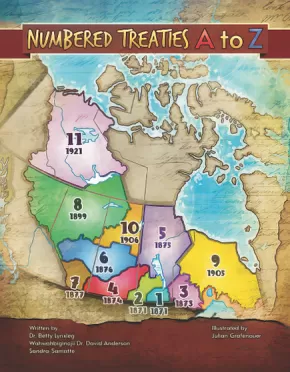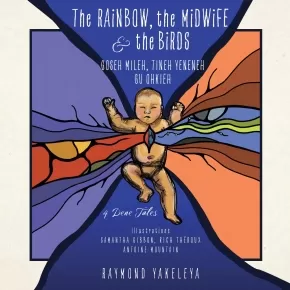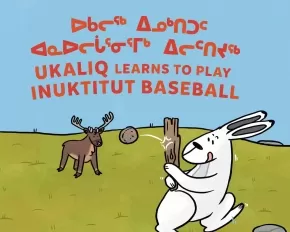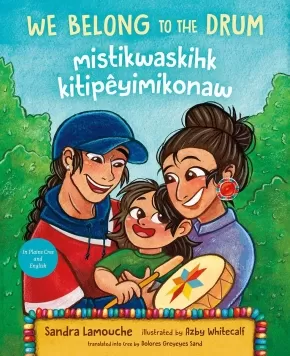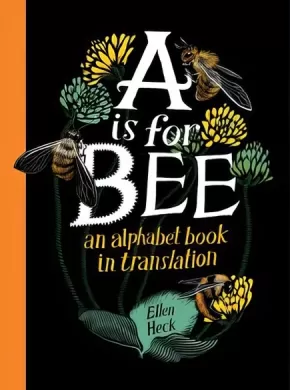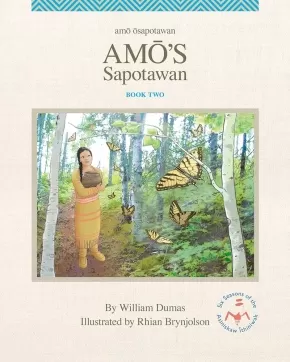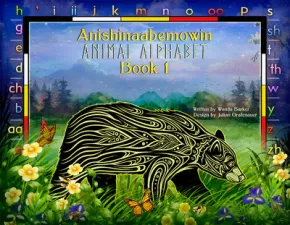
Language
166
-
180
of
422 Results;
Sort By
Go To
of 29
Strong Science - Animals: Deer in the Snow
 $7.50
$7.50

Artists:
Format:
Paperback
Text Content Territories:
Indigenous Canadian;
Grade Levels: Kindergarten; 1;
ISBN / Barcode: 9781771746168
Synopsis:
Synopsis:
This story is about how deer find food when it snows.
There are four seasons in the year: winter, spring, summer, and fall. Which season is this story about?
Educator & Series Information
Recommended for grade 1 students, but may also be useful in kindergarten classrooms.
Strong Science - Animals is a language-based science series for primary students featuring animals that all Canadian students will recognize. Photographs and Indigenous artwork illustrate the series. Common learning objectives in science curricula across Canada are addressed, and suggestions for extending the learning to other curriculum areas, including Indigenous cultural awareness, language arts, math, and art, are included in the teacher’s guide. The sixteen books in this series are grouped into four levels that increase in complexity, designed to accommodate students with various reading abilities within a classroom. This feature facilitates the use of this series in literacy programs along with the Strong Readers series.
Deer in the Snow is an EP3 (Early Primary 3) book in the Strong Science - Animals series. Font size decreases as language complexity and word count increase across levels: EP1 books have approximately 40 words, EP2 books have approximately 60 words, EP3 books have approximately 80 words, and EP4 books have approximately 100 words.
A teacher's guide for Strong Science - Animals is available: Strong Science - Animals: Teacher's Guide
Authenticity Note: This book has received the Indigenous Text label because the author is Indigenous (Lakota) and the featured animal holds cultural significance in many Indigenous cultures. The engaging story provides factual information in an easy-to-read format for children to learn science concepts and build literacy skills. It promotes respect for animals and Mother Earth, and its illustrations communicate additional cultural information through Lakota symbolism and designs. Further cultural connections are identified in the teacher's guide. Refer to the guide to explore the book's Indigenous connections fully. It is up to readers to determine if the book will work as a stand-alone authentic Indigenous text for their purposes.
Additional Information
16 Pages | 6.5" x 5.5" | Paperback | ISBN: 9781771746168
Strong Science - Animals: Mother and Baby Raccoons
 $7.50
$7.50

Artists:
Format:
Paperback
Text Content Territories:
Indigenous Canadian;
Grade Levels: Kindergarten; 1;
ISBN / Barcode: 9781771746137
Synopsis:
Synopsis:
This story is about the home mother raccoon makes in a tree for her babies. The home is called a den.
There are four seasons in the year: winter, spring, summer, and fall. Which season is this story about?
Educator & Series Information
Recommended for grade 1 students, but may also be useful in kindergarten classrooms.
Strong Science - Animals is a language-based science series for primary students featuring animals that all Canadian students will recognize. Photographs and Indigenous artwork illustrate the series. Common learning objectives in science curricula across Canada are addressed, and suggestions for extending the learning to other curriculum areas, including Indigenous cultural awareness, language arts, math, and art, are included in the teacher’s guide. The sixteen books in this series are grouped into four levels that increase in complexity, designed to accommodate students with various reading abilities within a classroom. This feature facilitates the use of this series in literacy programs along with the Strong Readers series.
Mother and Baby Raccoons is an EP3 (Early Primary 3) book in the Strong Science - Animals series. Font size decreases as language complexity and word count increase across levels: EP1 books have approximately 40 words, EP2 books have approximately 60 words, EP3 books have approximately 80 words, and EP4 books have approximately 100 words.
A teacher's guide for Strong Science - Animals is available: Strong Science - Animals: Teacher's Guide
Authenticity Note: This book has received the Indigenous Text label because the author is Indigenous (Lakota) and the featured animal holds cultural significance in many Indigenous cultures. The engaging story provides factual information in an easy-to-read format for children to learn science concepts and build literacy skills. It promotes respect for animals and Mother Earth, and its illustrations communicate additional cultural information through Lakota symbolism and designs. Further cultural connections are identified in the teacher's guide. Refer to the guide to explore the book's Indigenous connections fully. It is up to readers to determine if the book will work as a stand-alone authentic Indigenous text for their purposes.
Additional Information
16 Pages | 6.5" x 5.5" | Paperback | ISBN: 9781771746137
Strong Science - Animals: The Ducks Fly Away
 $7.50
$7.50

Artists:
Format:
Paperback
Text Content Territories:
Indigenous Canadian;
Grade Levels: Kindergarten; 1;
ISBN / Barcode: 9781771746175
Synopsis:
Synopsis:
This story begins with the ducks seeing the leaves on the trees turning red and yellow. How do you think this story ends?
There are four seasons in the year: winter, spring, summer, and fall. Which season is this story about?
Educator & Series Information
Recommended for grade 1 students, but may also be useful in kindergarten classrooms.
Strong Science - Animals is a language-based science series for primary students featuring animals that all Canadian students will recognize. Photographs and Indigenous artwork illustrate the series. Common learning objectives in science curricula across Canada are addressed, and suggestions for extending the learning to other curriculum areas, including Indigenous cultural awareness, language arts, math, and art, are included in the teacher’s guide. The sixteen books in this series are grouped into four levels that increase in complexity, designed to accommodate students with various reading abilities within a classroom. This feature facilitates the use of this series in literacy programs along with the Strong Readers series.
The Ducks Fly Away is an EP3 (Early Primary 3) book in the Strong Science - Animals series. Font size decreases as language complexity and word count increase across levels: EP1 books have approximately 40 words, EP2 books have approximately 60 words, EP3 books have approximately 80 words, and EP4 books have approximately 100 words.
A teacher's guide for Strong Science - Animals is available: Strong Science - Animals: Teacher's Guide
Authenticity Note: This book has received the Indigenous Text label because the author is Indigenous (Lakota) and the featured animal holds cultural significance in many Indigenous cultures. The engaging story provides factual information in an easy-to-read format for children to learn science concepts and build literacy skills. It promotes respect for animals and Mother Earth, and its illustrations communicate additional cultural information through Lakota symbolism and designs. Further cultural connections are identified in the teacher's guide. Refer to the guide to explore the book's Indigenous connections fully. It is up to readers to determine if the book will work as a stand-alone authentic Indigenous text for their purposes.
Additional Information
16 Pages | 6.5" x 5.5" | Paperback | ISBN: 9781771746175
Suliewey: The Sequel to My Indian
$16.95
Format:
Paperback
Text Content Territories:
Indigenous Canadian; First Nations; Beothuk; Mi'kmaq;
ISBN / Barcode: 9781550819885
Synopsis:
Synopsis:
Suliewey: The Sequel to My Indian continues the story of Mi’kmaw guide Sylvester Joe, whose traditional name is Suliewey, as he seeks out the last remaining Beothuk community.
In My Indian, Sylvester was hired by William Cormack in 1822 to guide him across Newfoundland in search of Beothuk encampments. In fact, he followed the advice of his Elders and guided Cormack away from the Beothuk.
In this sequel, having parted ways with Cormack at St. George’s Bay, Sylvester decides to go out on his own, in search of the winter camp of the last of the remaining Beothuk.
Written as fiction, by two Mi’kmaq authors, Suliewey: The Sequel to My Indian supports Mi’kmaq oral history of friendly relationships with the Beothuk.
The novel reclaims the settler narrative that the Beothuk and the Mi’kmaq of Newfoundland were enemies and represents an existing kinship between the Mi’kmaq and the Beothuk.
Rich in oral history, the descriptions of traditional ceremonies and sacred medicines, the use of Mi’kmaw language, and the teachings of two-spirit place readers on the land and embed them in the strong relationships described throughout the book.
Educator & Series Information
Recommended for ages 12 to 14.
This is the second book in the My Indian series.
Additional Information
232 pages | 5.25" x 8.00" | b&w illustrations | Paperback
232 pages | 5.25" x 8.00" | b&w illustrations | Paperback
Suupi and the Sun Celebration
$14.95
Artists:
Format:
Paperback
Text Content Territories:
Indigenous Canadian; Inuit;
Grade Levels: Preschool; Kindergarten;
ISBN / Barcode: 9781774506943
Synopsis:
Synopsis:
Join in on the Sun Celebration in Grise Fiord, Nunavut, in this charming bilingual storybook!
Suupi lives in Grise Fiord, Nunavut. After three months of darkness in her community, the sun is finally about to return. Suupi and her friends can’t focus on their schoolwork. Today they will celebrate the return of the sun! There will be a sliding competition, a school performance, and a community feast. But Suupi is nervous about performing with her class in front of so many people. Will she find a way to overcome her fear?
Written by an author from Grise Fiord, a community in Nunavut where the sun doesn’t rise for nine months, Suupi and the Sun Celebration introduces readers to traditions within this Northern community that commemorate the return of the sun each year.
Educator & Series Information
Recommended for ages 3 to 5.
Bilingual Inuktitut and English Edition
Themes: Family, Community, Return of the Sun, Celebrations, Singing, Traditional Songs, Throat Singing, Sun Celebration
This book is part of the Community Connections series.
Additional Information
44 pages | 8.00" x 8.00". Paperback
The Great Giants of the Arctic
$22.95
Artists:
Format:
Hardcover
Text Content Territories:
Indigenous Canadian; Inuit;
ISBN / Barcode: 9781774506608
Synopsis:
Synopsis:
“Long ago, there lived great giants in the Arctic.”
But where did they go? Learn all about the famous giants of the North, including Inukpasuksuk, Nuvuja, and others. Why do winds from the south bring warm weather? What happens when the giant in the sky gets upset? The Great Giants of the Arctic answers these questions and more using simple language for young readers to enjoy.
This stunningly illustrated bilingual picture book serves as an early-level introduction to the rich, mysterious world of Inuit mythology. Adapted by author and linguist Jaypeetee Arnakak with the intention of teaching Inuktitut as as a second language, The Great Giants of the Arctic can be enjoyed by Inuktitut language learners and curious young readers alike.
Educator Information
Recommended for ages 3 to 6.
Bilingual: Inuktitut and English
Additional Information
36 pages | 8.50" x 8.50"| Hardcover
The Numbered Treaties A to Z
$24.95
Artists:
Format:
Paperback
Text Content Territories:
Indigenous Canadian;
ISBN / Barcode: 9781990297342
Synopsis:
Synopsis:
Let us walk together through the ABCs of the Numbered Treaties. We purposefully use the ABC, a constructed Language system from the English Language, to talk back to the Numbered Treaties, so named without reference to our Own Language system or the Land.
First Nations People entered into Treaties and Agreements prior to Confederation and negotiated the Numbered Treaties after the Confederation of Canada in 1867.
Educator Information
Recommended for grades 4 to 6.
Additional Information
Paperback
The Rainbow, the Midwife, and the Birds: 4 Dene Tales
$29.95
Artists:
Format:
Paperback
Text Content Territories:
Indigenous Canadian; First Nations; Dene;
ISBN / Barcode: 9781988824574
Synopsis:
Synopsis:
The book contains four Dene stories, as told by Raymond Yakeleya. "Flight Through the Rainbow" is about flying through a rainbow in a small plane and experiencing multi-sensations of colour. It also tells the legend of the spider and how its web catches raindrops that create the rainbow. "The Midwife and the Spirit of Life," dedicated to Raymond's Granny Harriet Gladue, is about the birth of babies and bringing their spirits into the world. "The Slingshot and the Songbird" is about a boy's sadness over killing a friendly songbird. "The Medicine Brothers and the Giant Birds" is a tale told to Raymond by his uncle George Blondin about the hazards of giant animals when the world was new.
The book also contains Dene language translation of terms from the book.
Educator & Series Information
This book is recommended for ages 8 to 12.
This book is part of the Indigenous Spirit of Nature series.
Additional Information
48 pages | 8.50" x 8.50" | Paperback
The Story of the Fox and the Wolf
$22.95
Artists:
Format:
Hardcover
Text Content Territories:
Indigenous Canadian; Inuit;
ISBN / Barcode: 9781774506813
Synopsis:
Synopsis:
Wolf wants to know how Fox catches so many fish. Fox thinks Wolf is trying to play a trick on him. Wolf claims he will catch many more fish than Fox ever could. Can Fox teach Wolf a lesson about being boastful and greedy?
Discover this engaging retelling of an Inuit traditional story, which has been simplified for young readers to enjoy.
Educator Information
Recommended for ages 5 to 7.
Bilingual: Inuktitut and English
F&P Level: L
Additional Information
32 pages | 8.50" x 8.50" | Hardcover
Ukaliq Learns to Play Inuktitut Baseball (English/Inuktitut)
$14.95
Artists:
Format:
Paperback
Text Content Territories:
Indigenous Canadian; Inuit;
Grade Levels: Preschool; Kindergarten;
ISBN / Barcode: 9781774506615
Synopsis:
Synopsis:
Team Tuktu and Friends is up to bat! Ukaliq is excited to spend the day with his friends, but he’s nervous about playing Inuktitut baseball. What if he isn’t any good at it? Tiri is fast, Nanuq is strong, and Tuktu has good aim. What if Ukaliq can’t even hit the ball? As the game ramps up and Ukaliq steps up to the plate, will he be able to discover his own unique baseball talent?
Educator & Series Information
Recommended for ages 3 - 5.
This is an Arvaaq Book. Books in this series are intended for infants and very young children and are designed to help children develop physical, social, emotional, cognitive, and language skills.
Ukaliq Learns to Play Inuktitut Baseball shows children that everyone has their own unique skills.
F&P Level: L
Bilingual: English and Inuktitut
Additional Information
32 pages | 8.00" x 10.00" | Paperback
We Belong to the Drum / mistikwaskihk kitipeyimikonaw
$21.95
Artists:
Format:
Hardcover
Text Content Territories:
Indigenous Canadian; First Nations; Cree (Nehiyawak); Woodland Cree; Woods Cree; Bigstone Cree Nation;
Grade Levels: Preschool; Kindergarten;
ISBN / Barcode: 9781459834385
Synopsis:
Synopsis:
The drum represents the heartbeat of Mother Earth. We all belong to the earth and we all belong to the drum.
Nikosis grew up going to powwows with his family, happily immersed in music, dance and the sounds of the drum. But when he starts going to daycare, he doesn’t feel like he belongs. Nikosis cries every time his mother leaves him in the unfamiliar environment until, one day, she and the teachers use drums to help Nikosis find connection and comfort.
Inspired by her son’s experience—and her family's love of powwow music and dance—Indigenous educator and champion hoop dancer Sandra Lamouche shares this uplifting true story of the transformative effects of culturally safe and inclusive early childhood education.
Educator Information
Recommended for ages 3 to 5.
This is the dual-language version, in English and Plains Cree.
A free, downloadable poster for this book is available: Poster - We Belong to the Drum
About the Translator
As a first-language speaker of Plains Cree (nêhiyawêwin), translator Dolores Greyeyes Sand has devoted her career to teaching and promoting Cree language and cultural literacy at every opportunity, proudly following the path laid by her late mother, Dr. Freda Ahenakew, CM, SOM.
Find the English version here: We Belong to the Drum
Additional Information
32 pages | 8.75" x 10.75" | Hardcover
A Is for Bee: An Alphabet Book in Translation
$26.99
Artists:
Format:
Hardcover
ISBN / Barcode: 9781646141272
Synopsis:
Synopsis:
What letter does the word bee start with?
If you said "B" you're right – in English!
But in many, many languages, it actually starts with A.
Bee is Anū in Igbo,
Aamoo in Ojibwe,
Abelha in Portugese.
And Ari in Turkish.
Come and explore the gorgeous variations in the ways we talk about familiar things, unified and illuminated through Ellen Heck's eye-catching, graphic scratchboard details and hidden letterforms.
Educator Information
Recommended for ages 3 to 9.
Includes some Indigenous words.
Additional Information
40 pages | 7.75 x 10.5 | Hardcover
A Little Plains Cree Book for Children: A Reference for Teaching the Plains Cree Language
$74.95
Format:
Paperback
Text Content Territories:
Indigenous Canadian; First Nations; Cree (Nehiyawak); Plains Cree;
ISBN / Barcode: 9781778690044
Synopsis:
Synopsis:
A Little Plains Cree Book for Children contains useful noun categories, phrases, and some basic rules for the Plains Cree language. Following the themes of the Saskatchewan Curriculum Guide for Kindergarten to Grade 12 on Aboriginal Languages, the content focuses on terms familiar to the First Nations Cree people of Saskatchewan. This book should also be supplemented by total physical response (TPR) methods, in addition to teaching materials such as songs, games, and flash cards. Our hope is to encourage a basic understanding of the language so that learners are able to converse with Plains Cree speakers. The best path to fluency in the Plains Cree language is immersion, but learning one word at a time is a good place to start!
Educator Information
Recommended for ages 5+
A teaching guide can be found here: nēhiyawēwin awāsi-masinahikanis: A Little Plains Cree Book for Children—Teaching Guide
Find a colouring book here: A Little Plains Cree Colouring Book: Plains Cree People
Additional Information
96 pages | 8.50" x 11.00" | Paperback
Amo's Sapotawan
$33.00
Artists:
Format:
Hardcover
Text Content Territories:
Indigenous Canadian; First Nations; Cree (Nehiyawak); Woodland Cree; Rocky Cree;
ISBN / Barcode: 9781553799290
Synopsis:
Synopsis:
A Rocky Cree girl must choose the skill that will define her miskanaw, the path of her life, in the second book of The Six Seasons of the Asiniskaw Īthiniwak series.
Rocky Cree people understand that all children are born with four gifts or talents. When a child is old enough, they decide which gift, or mīthikowisiwin, they will seek to master. With her sapotawan ceremony fast approaching, Amō must choose her mīthikowisiwin. Her sister, Pīsim, became a midwife; others gather medicines or harvest fish. But none of those feel quite right.
Amō has always loved making things. Her uncle can show her how to make nipisiwata, willow baskets. Her grandmother can teach her how to make kwakwāywata, birchbark containers and plates. Her auntie has offered to begin Amō’s apprenticeship in making askihkwak, pottery.
What will Amō’s mīthikowisiwin be? Which skill should she choose? And how will she know what is right for her?
Educator & Series Information
Recommended for ages 9 to 11.
This is the second book in The Six Seasons of the Asiniskaw Īthiniwak series.
Reading Level: Fountas & Pinnell X
Includes some Cree language.
Additional Information
60 pages | 10.00" x 12.00" | Hardcover
Anishinaabemowin Animal Alphabet Book 1
$19.99
Artists:
Format:
Paperback
Text Content Territories:
Indigenous Canadian; First Nations; Anishinaabeg; Ojibway;
ISBN / Barcode: 9781990297526
Synopsis:
Synopsis:
Anishinaabe educator and author Wanda Barker, Bear Clan from Hollow Water First Nation brings her knowledge and fluency in Anishinaabemowin to language learners in her book Anishinaabemowin Animal Alphabet Book 1. This alphabet book focuses on the letters used in the double vowel writing system. The book focuses on learning the names of animals, information on the animals and their actions. A double vowel chart to learn the sounds and pronunciation is included.
Educator Information
Recommended for grades 1 to 3.
Additional Information
36 Pages
Sort By
Go To
of 29









